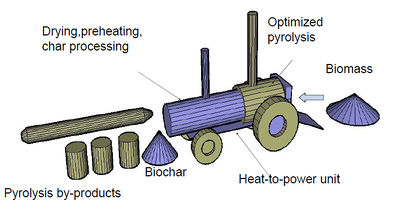The Charvester (biochar producing tractor): Difference between revisions
Jump to navigation
Jump to search
(Created page with "{{Category=Food and Agriculture}} {{Category=Energy}} [[File:Charvester.jpg|400px|thumb|right|Based on an estimated capacity of 500 kg char/hour and a utitlity factor of 68%, ...") |
m (categorized) |
||
| Line 16: | Line 16: | ||
* Project leader: [http://www.geo.uu.se/biokol/default.aspx?pageid=37&lan=0 Lars Hylander, Uppsala universitet] | * Project leader: [http://www.geo.uu.se/biokol/default.aspx?pageid=37&lan=0 Lars Hylander, Uppsala universitet] | ||
* poster with illustrations: [http://www.ibi2010.org/wp-content/uploads/CharvesterRioPoster.pdf IBI Meeting, Rio 2010] (internal copy [[Media:CharvesterRioPoster.pdf|here]]) | * poster with illustrations: [http://www.ibi2010.org/wp-content/uploads/CharvesterRioPoster.pdf IBI Meeting, Rio 2010] (internal copy [[Media:CharvesterRioPoster.pdf|here]]) | ||
[[Category:Biochar]] | |||
Latest revision as of 15:03, 14 May 2017
Goal: develop a mobile pyrolysis unit for production of biochar from waste organic material. By incorporating the biochar into soil, soil fertility and water holding capacity are improved and nutrient leaching reduced.
The aim is threefold:
I.) mitigating high air CO2 levels
II.) improve soil fertility
III.) deliver energy to the agriculture and raw materials to the synthetic industry.
The ”heart” of the project is a ”charvester”, a mobile unit for pyrolysis (that is heating at restricted oxygen supply) of organic waste material in a closed system. Gases produced such as hydrogen, carbon oxide and methane will be collected and serve in the chemical industry as an energy source.
- extensive project overview here
- Project leader: Lars Hylander, Uppsala universitet
- poster with illustrations: IBI Meeting, Rio 2010 (internal copy here)
